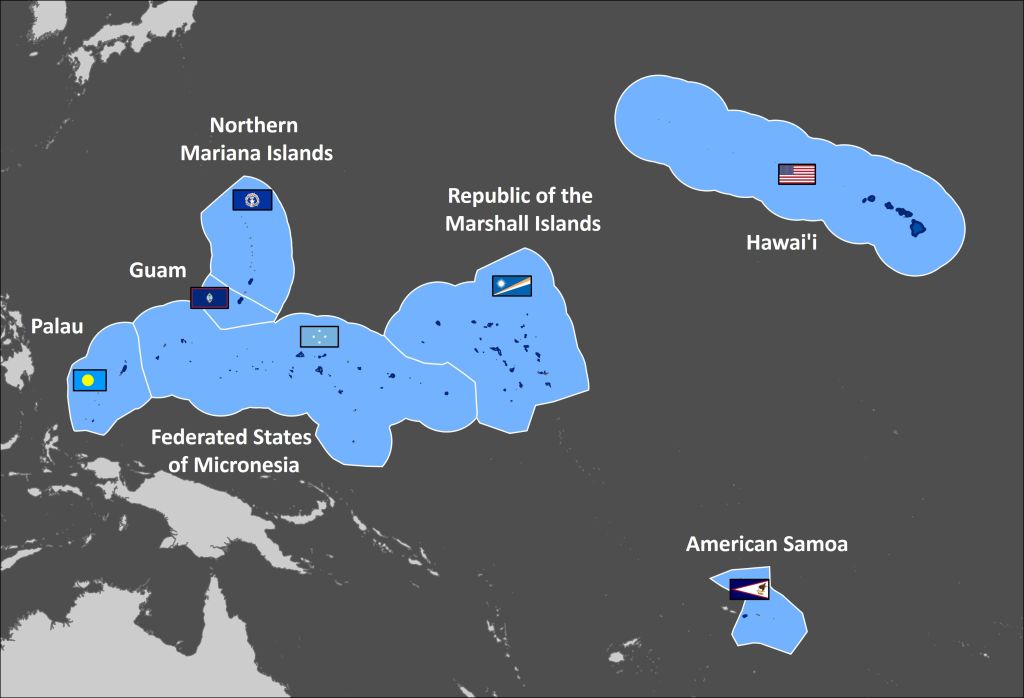Pacific Regional Invasive Species and Climate Change (Pacific RISCC) Management Network
Building a Community of Practice
Ecosystems in the Pacific Islands are being transformed by two large-scale, interacting threats: invasive species and climate change. We have joined with entities across the Pacific to explore perspectives, needs, and research related to the confluence of invasive species management and climate adaptation in our region.
Pacific RISCC Partners:
- American Samoa Community College
- Commonwealth of the Northern Mariana Islands (CNMI) Division of Fish and Wildlife, Department of Lands & Natural Resources
- Coordinating Group on Alien Pest Species (CGAPS)
- Hawaiʻi Department of Land and Natural Resources – Division of Forestry and Wildlife
- Hawaiʻi Invasive Species Council
- Pacific Islands Climate Adaptation Science Center (PI-CASC)
- Pacific Research on Island Solutions for Adaptation (Pacific RISA)
- Palau Community College
- University of Guam
- University of Hawaiʻi
- U.S. Fish and Wildlife Service (USFWS)
- U.S. Geological Survey (USGS)
To learn more about the unique climate change and invasive species challenges our partners face across the Hawai’i and U.S.-Affiliated Pacific Islands region, please check out our 6 short videos premiered at the 2021 IUCN World Conservation Congress in Marseilles, France. And join our growing community of practice by subscribing to our listserv.
Our Objectives
- Identify priority lines of research, informed by managers, to examine the interactions between invasive species and climate change
- Develop management strategies and actions to these combined threats while strengthening existing, successful approaches
- Create a space for engagement and communication of lessons learned
- Facilitate a network of resource managers, researchers, and interested community members and organizations
- Promote relevant research and develop effective information-sharing strategies
Recent Events
Want to stay up to date with Pacific RISCC’s upcoming events and activities? Join the Pacific RISCC Listserv where we share upcoming webinars, research summaries, workshops, jobs, and more. To join add your info here (link).
Check out our latest Pacific RISCC Publication!
Pacific Island Perspectives on Invasive Species and Climate Change
Ecosystem health and sustainability worldwide are threatened by the independent and interacting impacts of invasive species and climate change. In this book chapter, we first consider the state of knowledge and the compounding impacts of these two threats with an emphasis on sustainability in the Pacific Region. We then describe the evolution of the Pacific RISCC that represents the US Territories of Guam and American Sāmoa, the Commonwealth of the Northern Mariana Islands (CNMI), the Republic of Palau, the Federated States of Micronesia, and the Republic of the Marshall Islands (collectively referred to as the US-Affiliated Pacific Islands, USAPI), and the U.S. State of Hawaiʻi. Finally, we present two regional case studies as examples of how Pacific RISCC research is promoting Pacific Island resilience and sustainable outcomes through climate-literate resource management.
Recommended citation: Brewington L., Eichelberger B., Read N., Parsons E., Kerkering H., Martin C., Miles W., Burgett J., Idechong J., 2023. Pacific Island Perspectives on Invasive Species and Climate Change, In: Walsh S.J., Mena C.F., Stewart J.R., and Muñoz Pérez J.P. (Eds.) Social and Ecological Interactions in the Galapagos Islands, Island Ecosystems: Challenges to Sustainability (pp. 59-78), New York: Springer.
Check out our survey!
When Invasive Species & Climate Change Intersect: Survey of Hawaiʻi Natural Resource Managers
This report summarizes the findings from a survey of natural resource managers in Hawaiʻi to establish a baseline assessment of concern about the influence of climate change on invasive species management, compare their access to and understanding of existing downscaled climate information for the state, and identify barriers to success in incorporating climate change into management practices.
The Pacific RISCC is using the survey results to identify tailored research opportunities on these two drivers of ecosystem change that will aid in the development and implementation of climate-adaptive management practices in Hawaiʻi and the US Affiliated Pacific Islands (USAPI) region.
Recommended citation: Brewington L, Burgett J, Martin C, Kerkering H, Arnott C. 2021 . When Invasive Species and Climate Change Intersect: Survey of Hawaiʻi Natural Resource Managers. Honolulu: The Pacific Regional Invasive Species and Climate Change Management Network.
Action Items:
(A) Consolidate existing information and products at the invasives/climate nexus into one centralized/accessible location. Compile relevant peer-reviewed articles, technical reports, tools, and other resources on this website.
(B) Continue the webinar series and engage in other conferences/workshops as available. Potential topics include, but are not limited to: better understanding of uncertainty and information on potential range shifting species, native community resilience, effects and nature of extreme events, new introduction pathways, and impacts of seasonal changes.
(C) Create the needed organizational framework to facilitate discussions and set priorities at the invasives/climate nexus and move this effort forward in Hawaiʻi and the USAPI. This includes finalizing our core team and science advisory board.
(D) Strategically plan next steps, identifying/prioritizing needs/gaps, and determining where the most value can be added.
(E) Collaboratively-developed research agendas for the Pacific Islands region, which has different native biotas, divergent climate change projections, and a range of invasive species threats.
(F) Research summaries for managers to use in developing adaptive management programs.





